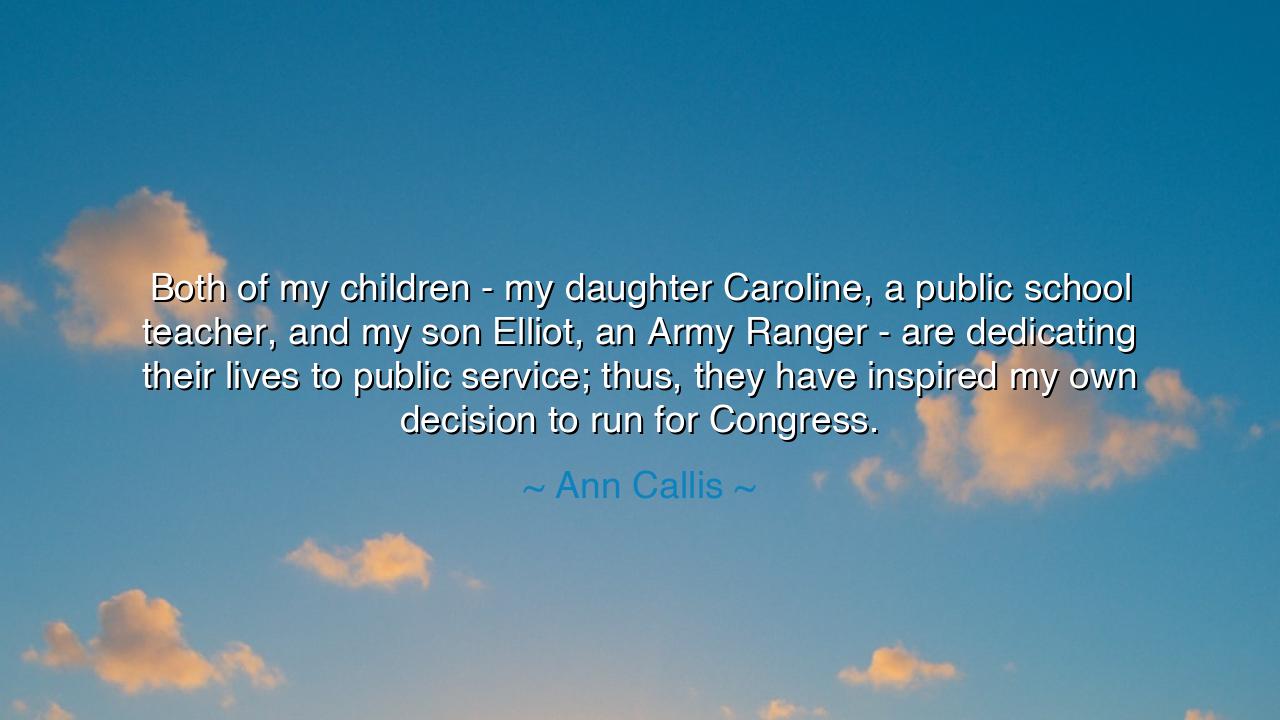
Both of my children - my daughter Caroline, a public school
Both of my children - my daughter Caroline, a public school teacher, and my son Elliot, an Army Ranger - are dedicating their lives to public service; thus, they have inspired my own decision to run for Congress.






“Both of my children—my daughter Caroline, a public school teacher, and my son Elliot, an Army Ranger—are dedicating their lives to public service; thus, they have inspired my own decision to run for Congress.” So spoke Ann Callis, judge and servant of the people, whose words reveal the ancient chain of inspiration that binds generations together. In her saying there is humility: a mother looking not to her own achievements, but to the sacrifices of her children. In their choices—one to teach, one to defend—she found the courage to take up her own calling, to labor for the common good.
The meaning is clear yet profound. For when she names her daughter, a public school teacher, she honors the quiet heroes who shape the minds of the young, who carry the burden of sowing knowledge in often barren soil. And when she names her son, an Army Ranger, she honors those who place their very bodies as shields for the nation. Both paths, though different, converge upon the same truth: the greatness of a life is measured not in wealth or comfort, but in service. Inspired by these examples within her own home, Callis resolved that she too must give her strength to the people, not by sword or chalk, but by law and governance.
This saying reminds us of a timeless pattern: that the deeds of one generation stir the hearts of the next. History shows this again and again. Consider Themistocles, whose leadership in the Persian Wars was shaped by the memory of his father’s civic devotion. Or recall John Adams, who, inspired by his Puritan forebears, passed to his son John Quincy not merely a name, but the spirit of duty. Just as fire passes from torch to torch, so does the flame of public service spread from parent to child, and sometimes from child back to parent. Such is the power of example—it transcends age, rank, and position.
Yet Callis’s words also remind us that inspiration is not always top-down. We often imagine parents as guiding lights for their children, but here the children become the teachers. Caroline, shaping young minds, and Elliot, defending the nation, are themselves the living lessons. Their mother, in beholding their courage and sacrifice, was moved to enlarge her own field of service. Thus we see that wisdom flows not only from elders to youth, but also from youth to elders. To live honorably at any age is to teach others how to live.
There is heroism, too, in the balance of these vocations. The teacher and the soldier embody two pillars of civilization: one preserves through knowledge, the other protects through strength. Both are acts of self-giving, requiring patience, discipline, and sacrifice. By invoking both, Callis presents a vision of society held firm by those willing to give more than they take. It is upon such foundations that nations endure. And from such examples, new leaders are born, leaders who understand that governance, too, must be a form of public service rather than private gain.
The lesson for us, then, is to remember that our lives, however ordinary they may seem, can ignite the lives of others. We may think our teaching unnoticed, our sacrifices unmarked, our quiet duties forgotten. Yet in truth, someone is always watching, always learning, always being inspired. By living faithfully in service, we plant seeds that may grow into actions far beyond our imagining—even into the courage of another to take up the burden of leadership.
Therefore, dear listener, take these words as a call. Serve where you are planted: in the classroom, in the field, in the home, in the office. Do not scorn small acts of duty, for they may inspire others to great acts. And when you are stirred by the example of those around you—whether child, friend, or stranger—do not ignore it. Let it move you, as it moved Ann Callis, to take up your own work for the common good. For in the chain of inspiration, each of us is both torchbearer and torch-passer, each of us capable of kindling in others the eternal flame of public service.






AAdministratorAdministrator
Welcome, honored guests. Please leave a comment, we will respond soon